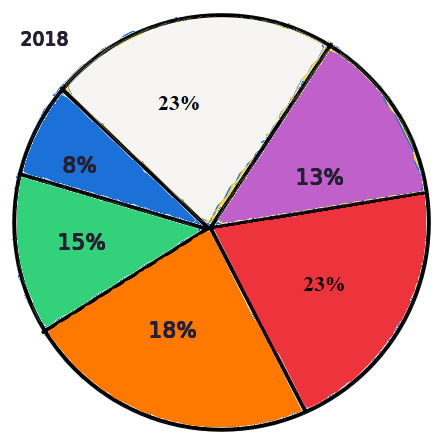
MOCK TEST - 1 - Data Interpretation and Logical Reasoning (DILR Section)
Data Interpretation and Logical Reasoning (DILR) is one of the section of CAT exam along with Quantitative Aptitude and Verbal Ability and Reading comprehension. Practice tests help aspirants to prepare for the exams.
Data Interpretation determines the persons ability to analyze, compute and process the collected information in different format to determine the significance and implications of collected information thereby deriving appropriate conclusion.
On the other hand Logical reasoning (deductive reasoning) refers to the ability of a candidate to understand and logically work through concepts and problems mainly by using common sense and logic to derive appropriate conclusion.
Maximum Time for this section: 40 : 00 (Minutes : Seconds)
Total number of Questions: 68
Total number of MCQ's Questions: 50
Total Number of Non-MCQ's (TITA) Questions: 18
Total number Quantitative Ability (QA) Questions: 22
Total number Quantitative Ability (QA) MCQ's Questions: 14
Total number Quantitative Ability (QA) non-MCQ's (TITA) Questions: 08
Total number Data Interpretation and Logical Reasoning (DILR) Questions: 20
Total number Data Interpretation and Logical Reasoning (DILR) MCQ's Questions: 15
Total number Data Interpretation and Logical Reasoning (DILR) non-MCQ's (TITA) Questions: 05
Total number Verbal Ability & Reading Comprehension (VARC) Questions: 26
Total number Verbal Ability & Reading Comprehension (VARC) MCQ's Questions: 21
Total number Verbal Ability & Reading Comprehension (VARC) non-MCQ's (TITA) Questions: 05
Maximum Time: 40 : 00 (Minutes : Seconds) per section
Note-1: Use of simple calculator is allowed.
Note-2: Not allowed to change section once selected.
Directions (for questions 1 to 5): Refer the PIE Chart below and answer the questions based on it. The PIE Chart show the number of programmers for different programming languages for two different years. The total number of programmers in 2018 is 2000. The number of programmers in 2020 grew by 20% over the number of programmers in the year 2018.

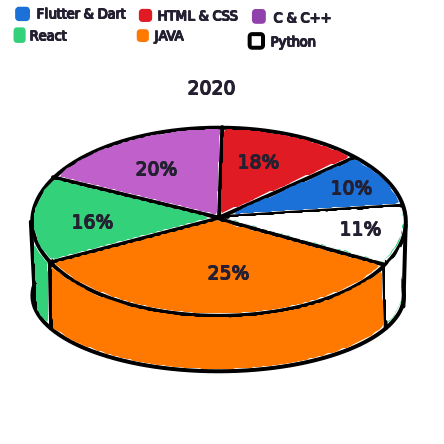
01. Find the Percentage (%) increase in the number of programmers for the programming language Flutter in the year 2020.
Options:
Option (a): 25%
Option (b): 50%
Option (c): 33.33%
Option (d): 75%
There are two increases -
one in total number of programmers (20%) for and another in the percentage share of the programmers (25%).
Using successive percentage increase, the net change = 20 + 25 + (20x25/100) = 50%
Directions (for questions 1 to 5): Refer the PIE Chart below and answer the questions based on it. The PIE Chart show the number of programmers for different programming languages for two different years. The total number of programmers in 2018 is 2000. The number of programmers in 2020 grew by 20% over the number of programmers in the year 2018.


02. Which is the following the programming language with least percentage (%) increase in the number of programmers for the year 2020 compared to 2018
Options:
Option (a): HTML & CSS
Option (b): React
Option (c): JAVA
Option (d): C & C++
React. Visual inspection.
Option (b).
Directions (for questions 1 to 5): Refer the PIE Chart below and answer the questions based on it. The PIE Chart show the number of programmers for different programming languages for two different years. The total number of programmers in 2018 is 2000. The number of programmers in 2020 grew by 20% over the number of programmers in the year 2018.


03. Which is the following programming language has shown decrease in the number of programmers from the year 2018 to 2020?
Options:
Option (a): C & C++
Option (b): React
Option (c): Python
Option (d): None of these.
Python. Visual inspection.
Option (c).
Directions (for questions 1 to 5): Refer the PIE Chart below and answer the questions based on it. The PIE Chart show the number of programmers for different programming languages for two different years. The total number of programmers in 2018 is 2000. The number of programmers in 2020 grew by 20% over the number of programmers in the year 2018.


04. Find the maximum difference between the number of programmers of any two programming languages taken together for any one year and that of other two programming languages for the other year.
Case 1: Two programming languages having the highest number of programmers in 2018 and simultaneously the two categories having the least number of workers in 2020.
Therefore, difference = (460 + 460) - (240 + 264) = 416.
Case 2: Two categories having the highest number of programmers in 2020 and simultaneously the two categories having the lowest number of programmers in 2018.
Therefore, difference = (600 + 460) - (160 + 260) = 640
Directions (for questions 1 to 5): Refer the PIE Chart below and answer the questions based on it. The PIE Chart show the number of programmers for different programming languages for two different years. The total number of programmers in 2018 is 2000. The number of programmers in 2020 grew by 20% over the number of programmers in the year 2018.


05. For how many programming languages, number of programmers have increased.
4. - Visual inspection.
Directions (for questions 6 to 8): In each question below are given two statements numbered I and II. You have to take the two given statements as true even if they seem to be at variance with commonly known facts. Read all the conclusions and then decide which of the given conclusions logically follow from the given statements, disregarding commonly known facts.
Statement I: All veggies have gravy.
Statement II: All lunch has veggies.
Options:
Option (a): All lunch has gravy.
Option (b): Some gravy have veggies.
Option (c): Both (a) and (b).
Option (d): None of these.
Option (a): All lunch has gravy.
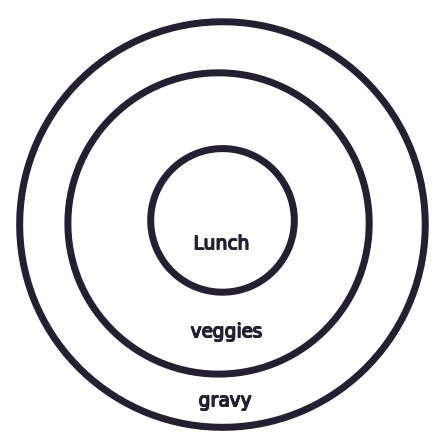
Directions (for questions 6 to 8): In each question below are given two statements numbered I and II. You have to take the two given statements as true even if they seem to be at variance with commonly known facts. Read all the conclusions and then decide which of the given conclusions logically follow from the given statements, disregarding commonly known facts.
Statement I: Steven Spielberg is a good director.
Statement II: Directors are intelligent.
Options:
Option (a): All intelligent are directors.
Option (b): Steven Spielberg is intelligent.
Option (c): Both (a) and (b).
Option (d): None of these.
Option (b): Steven Spielberg is intelligent.
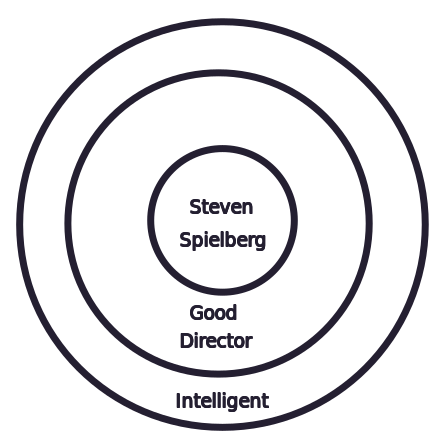
Directions (for questions 6 to 8): In each question below are given two statements numbered I and II. You have to take the two given statements as true even if they seem to be at variance with commonly known facts. Read all the conclusions and then decide which of the given conclusions logically follow from the given statements, disregarding commonly known facts.
Statement I: Some Whites are Black.
Statement II: Grey is Black.
Options:
Option (a): Some white are grey.
Option (b): Some black are grey.
Option (c): All grey are white.
Option (d): None of the above follows.
Option (b): Some black are grey.
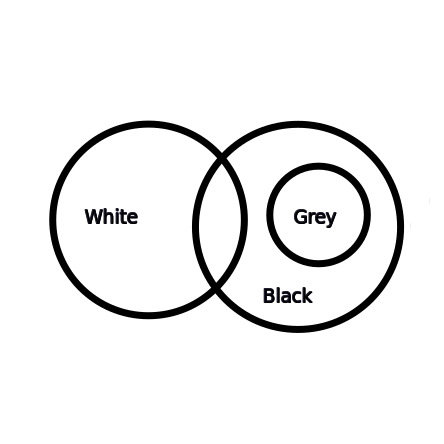
Directions (for questions 9 and 10): Two/Three/Four statements are given in each of the following questions, followed by three/four conclusions numbered I, II, III and IV. You have to take the given statements to be true even, if they seem to be at variance from commonly known facts. Read all the conclusions and then decide which of the given conclusions logically follows from the given statements disregarding commonly known facts.
Statement I: Some Decades are Centuries.
Statement II: All Millennium are Centuries.
Conclusion I: Some Millenniums are Decades.
Conclusion II: Some Centuries are Decades.
Conclusion III: No Millennium is a Decade.
Options:
Option (a): Conclusions I and II follow.
Option (b): Conclusions I and III follow.
Option (c): Either I or III and II follows.
Option (d): Conclusions II follow.
Only option (c) i.e., Either I or III and II follows.
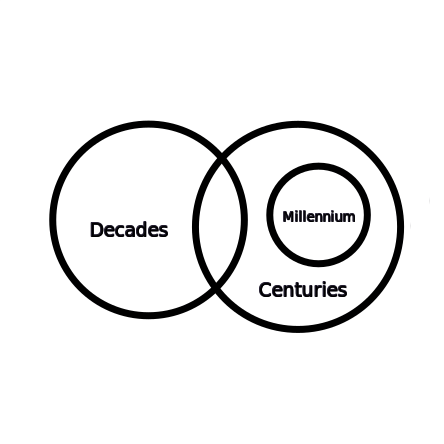
Directions (for questions 9 and 10): Two/Three/Four statements are given in each of the following questions, followed by three/four conclusions numbered I, II, III and IV. You have to take the given statements to be true even, if they seem to be at variance from commonly known facts. Read all the conclusions and then decide which of the given conclusions logically follows from the given statements disregarding commonly known facts.
Statement I: Some philosophers are fools.
Statement II: Some fools are illiterates.
Statement III: Some philosophers are illiterates.
Statement IV: Aristotle was a great Greek philosopher.
Conclusion I: Aristotle was an illiterate.
Conclusion II: All illiterates are philosophers.
Conclusion III: All illiterates are fools.
Conclusion IV: Aristotle was a fools.
Options:
Option (a): Conclusions I and II follow.
Option (b): Conclusions I and III follow.
Option (c): Either I or III and II follows.
Option (d): None of the conclusions follow.
Option (e) None of the conclusions follow.
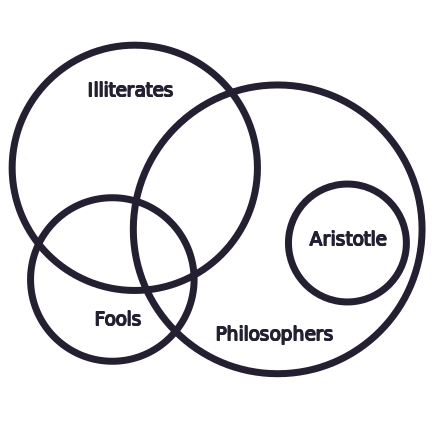
Directions (for questions 11 to 14): Study the following information carefully and answer the given questions. A word and number arrangement machine when given an input line of words and numbers rearranges them following a particular rule in each step. The following is an illustration of input and rearrangement.
Input: red pink 22 32 87 gold 44 tan
Step I: 22 red pink 32 87 gold 44 tan
Step II: 22 tan red pink 32 87 gold 44
Step III: 22 tan 32 red pink 87 gold 44
Step IV: 22 tan 32 red 44 pink 87 gold
Step IV is the last step of the rearrangement.
11. Step III of an input is 11 yep 22 83 today new google 59, which of the following will definitely be the input?
Options:
Option (a): 22 83 today new google 59 11 yep.
Option (b): 22 83 today yep new google 59 11.
Option (c): 22 11 yep 83 today new google 59.
Option (d): cannot be determined.
Option (d), Cannot be determined as we cannot judge the initial position of letters and numbers.
Directions (for questions 11 to 14): Study the following information carefully and answer the given questions. A word and number arrangement machine when given an input line of words and numbers rearranges them following a particular rule in each step. The following is an illustration of input and rearrangement.
Input: red pink 22 32 87 gold 44 tan
Step I: 22 red pink 32 87 gold 44 tan
Step II: 22 tan red pink 32 87 gold 44
Step III: 22 tan 32 red pink 87 gold 44
Step IV: 22 tan 32 red 44 pink 87 gold
Step IV is the last step of the rearrangement.
12. Input men 77 oven 63 love 43 jog 17. How many steps will be required to complete the rearrangement?
Five.
Input: men 77 oven 63 love 43 jog 17
Step I: 17 men 77 oven 63 love 43 jog
Step II: 17 oven men 77 63 love 43 jog
Step III: 17 oven 43 men 77 63 love jog
Step IV: 17 oven 43 men 77 79 love jog
Step V: 17 oven 43 men 63 love 77 jog
Directions (for questions 11 to 14): Study the following information carefully and answer the given questions. A word and number arrangement machine when given an input line of words and numbers rearranges them following a particular rule in each step. The following is an illustration of input and rearrangement.
Input: red pink 22 32 87 gold 44 tan
Step I: 22 red pink 32 87 gold 44 tan
Step II: 22 tan red pink 32 87 gold 44
Step III: 22 tan 32 red pink 87 gold 44
Step IV: 22 tan 32 red 44 pink 87 gold
Step IV is the last step of the rearrangement.
13. Step III of an Input 18 town 38 box 82 76 hall new. Which of the following will be step VI?
Options:
Option (a): 38 hall 18 town 76 new box 82.
Option (b): 18 hall 38 town 76 new box 82.
Option (c): 18 town 38 hall 76 new box 82.
Option (d): 18 town 38 new 76 hall box 82.
Step III: 18 tower 38 basket 82 76 hall new
Step IV: 18 tower 38 new basket 82 76 hall
Step V: 18 tower 38 new 76 basket 82 hall
Step VI: I8 tower 38 new 76 hall basket 82 => Option (d)
Directions (for questions 11 to 14): Study the following information carefully and answer the given questions. A word and number arrangement machine when given an input line of words and numbers rearranges them following a particular rule in each step. The following is an illustration of input and rearrangement.
Input: red pink 22 32 87 gold 44 tan
Step I: 22 red pink 32 87 gold 44 tan
Step II: 22 tan red pink 32 87 gold 44
Step III: 22 tan 32 red pink 87 gold 44
Step IV: 22 tan 32 red 44 pink 87 gold
Step IV is the last step of the rearrangement.
14. Step III of an Input 32 style 48 94 join for 81 home. How many steps will be required to complete the rearrangement?
Step III: 32 style 48 94 join for 81 home
Step IV: 32 style 48 join 94 for 81 home
Step V: 32 style 48 join 81 94 for home
Step VI: 32 style 48 join 81 home 94 for
Directions (for questions 15 to 18): Choose the best alternatives as the answer.
A cricket always has ........
Options:
Option (a): Pitch.
Option (b): Gloves.
Option (c): Pads.
Option (d): Bat.
Option (d): Bat.
Directions (for questions 15 to 18): Choose the best alternatives as the answer.
A school always has ........
Options:
Option (a): Library.
Option (b): Teacher.
Option (c): Building.
Option (d): Classes.
Option (b): Teacher
Directions (for questions 15 to 18): Choose the best alternatives as the answer.
What always Worries?
Options:
Option (a): Difficulty.
Option (b): Poignancy.
Option (c): Unrest.
Option (d): Non-Co-operation.
Option (c): Unrest
Directions (for questions 15 to 18): Choose the best alternatives as the answer.
Milk always contains ..........
Options:
Option (a): Sugar.
Option (b): Fat.
Option (c): Water.
Option (d): Calcium.
Option (d): Calcium
Raja is son of Aman's father's sister. Sachin is son of Gauri, who is the mother of Gaurav and grandmother of Aman. Aryan is the father of Tanya and grandfather of Raja. Gauri is the wife of Aryan. How is Raja related to Gauri?
Grandson
The Republic Day of India was celebrated on Wednesday in the year 2022. On which day, will it be celebrated in the year 2023?
Options:
Option (a): Monday.
Option (b): Tuesday.
Option (c): Thursday.
Option (d): Friday.
Thursday
Page updated in: December 2022
Designed with
Offline Website Builder